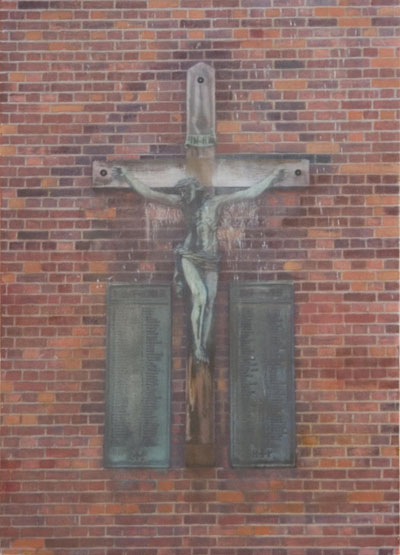 Hackney Wick-ed, 2006 Peter Davis Peter Davis is from a generation of painters who emerged in the early 90's and whose work undermined any narrative or representational content. Alongside a group of other young British artists Davis quickly became celebrated for investigating the language used in paintings of late Modernism. In his first solo exhibition in the UK since 2000 Davis presents new developments in his abstract paintings alongside brand new representational paintings, that some may see as a dramatic departure to the abstract work, but which continue the artist's exploration into the insecurities of painting. As with Davis' well known process paintings the viewer is forced to engage with the surface of the paintings; figure and ground are destroyed, subject distanced, process pronounced and the authorial presence detached. Davis' abstract paintings start their life in a car factory where a base colour is sprayed onto a piece on aluminium, once baked and polished the artists applies another layer of paint with a roller. This layer is immediately removed with a squeegee and the process of layering and removing is repeated till the artist is content with its conclusion. The combination of chance and the mechanistic process are of great importance to the artist; the suggested removal of the authoritative artist and the highly polished surface confuse the viewers desire to assign a meaning to the work, seen next to representative paintings by the artist this confusion will be heightened. In his abstract paintings Davis stresses the mode of production as being almost mechanical and the gesture as being infinitely repeatable. In his most recent paintings it is no coincidence that the artist selects photographs from his family album and recent holiday snaps. Discoloured Polaroid's of daytrips and quasi-familiar cityscapes which could have been lifted from any photograph album across the country are the source of Davis' recent paintings. They are however selected not for their personal or geographical significance but rather for their compositional interest. The scenes are familiar yet specifics are not known; a summer meadow, a European cityscape or a graduation photograph. Skilfully and painstakingly the artist reproduces these images in precise detail, using layer upon layer of thin paint the artist emulates a process similar to that of the abstracts, with layers of the paint being removed by the artist throughout the process. In its final stages the painting is delivered a final removal of the paint with the addition of three or four layers of varnish added to the final painting so as to remove any traces of brush work. The viewer is left struggling to read the signs that the painting once held. In slavishly copying an image that already exists the act of painting is again surrendered to a technique of mechanical reproduction. The artist looks to Modernism, its promises, failings and position within art history to continue the contemporary debate surrounding the possibility of painting. One such work, a painting of a crucifix that is handled in the same manner as all his representational works, can be seen as a fundamental exploration of painting and one of its oldest subjects within the history of art. Davis' crucifix is one that until recently he passed everyday on his way to his Eastend studio, of course the viewer can never know this and the title does not allude to the fact, rather it could be any pigeon soiled crucifix in any Christian country, removed and entrenched in layers of paint. At the same time and in hanging the two distinct styles next to one another the recent 90's cult of the artist and a linear art history are both questioned by Davis. Davis graduated from Goldsmiths in 1993, the following year he had his first solo exhibition with Karsten Schubert, he has since exhibited widely in the UK at Waddington Gallery, Asprey Jacques, the Southampton City Art Gallery, Leeds City Art Gallery and the Hayward. Internationally Davis has exhibited in America, Amsterdam and Zurich, his work is held in numerous public and private collections world wide, including the Museum of Modern Art, Miami, the Prada Foundation, Italy, the Saatchi Collection, London and the Southampton City Art Gallery, Southampton. Exhibition: 22 November - 19 December 2006 Gallery hours: Tues-Fri 11 am - 6 pm, Sat 11 am - 4 pm, Late night Tuesday 11 am - 8 pm Rokeby 37 Store Street GB-London WC1E 7QF Telephone +44 (0)20 7168 9942 Fax +44 (0)7813 144 919 Email rokeby@rokebygallery.com www.rokebygallery.com |